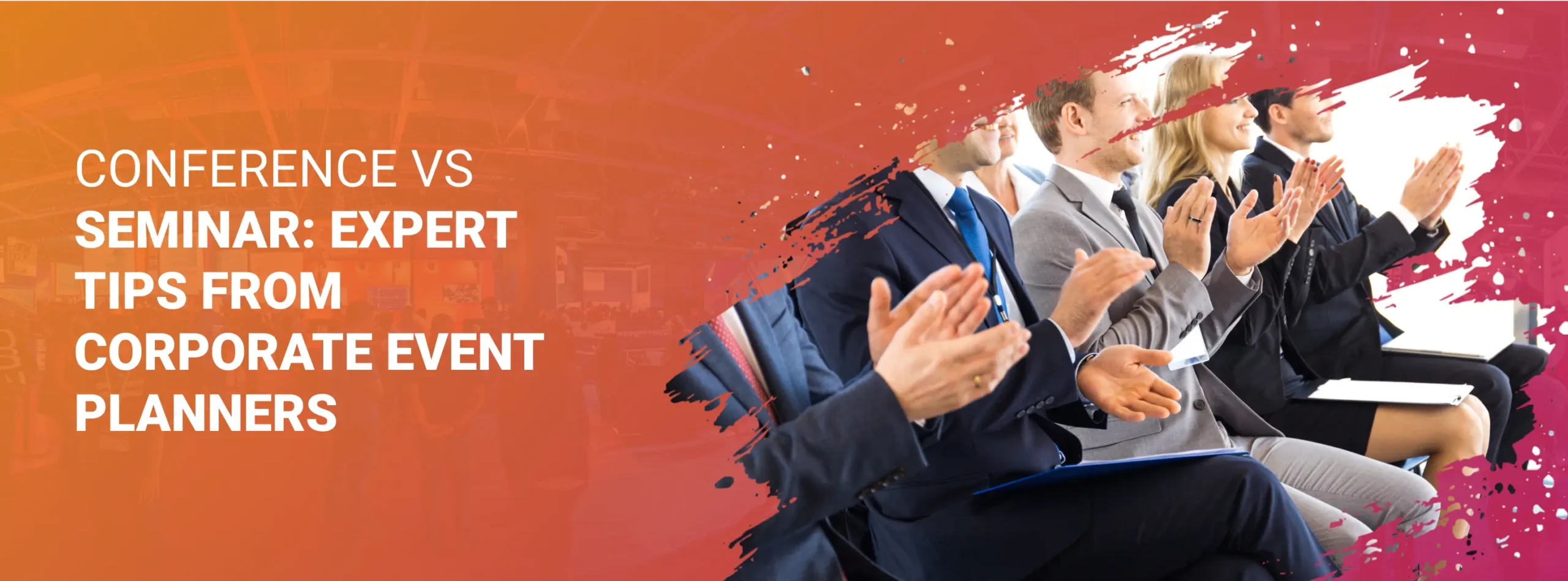
Conference vs Seminar: Expert Tips from Corporate Event Planners
Introduction
Understanding whether your next corporate event should be a conference or a seminar is critical. This choice has an effect on the budget, the location, the content, the experience of the attendees, and the return on investment. In this guide, we break down the conference vs seminar debate, highlight major differences, and give planner-tested ideas to help you choose the best format for maximum effect. If you’ve ever wondered about the difference between conference and seminar, this article will give you a clear and practical comparison.
Team building not only builds real connections but also promotes teamwork, encourages collaboration, and boosts creative thinking. Such activities give your employees a chance to express themselves and show their fun side to their colleagues. But choosing and planning such activities can be overwhelming. Hence, it is advisable to connect with corporate event management companies that will suggest the right activity for your employees’ event and help you book and manage the venue.
Ready to encourage, energise, and educate your team? If you want to boost the morale of your employees with fun and engaging activities, you have come to the right place! This blog will cover custom activities that will help your team motivate and rejuvenate your employees in a fun way. So, let’s dive in!
What is a Conference and a Seminar?
Conference:
Seminar:
Conference vs Seminar: Quick Comparison Table
| Aspect | Conference | Seminar |
|---|---|---|
| Typical Size | Hundreds to thousands | 20–150 participants |
| Duration | 1–3 days (or more) | 1–4 hours to 1 day |
| Goal | Industry updates, networking, lead generation | Skill-building, in-depth learning |
| Format | Multiple tracks, panels, exhibits | Single track, workshops, discussion-focused |
| Attendee Role | Observe, network | Participate, practice, ask questions |
| Cost | Higher (venue, production, exhibitors) | Lower (smaller venue, fewer staff) |
Key Factors in Choosing the Right Format
Primary Objective
Audience Profile
Budget and Sponsorship
Timeline & Logistics
Content Depth
Engagement Strategy
Planner’s Checklist: Step-by-Step
- Define objectives and KPIs (attendance, leads, satisfaction)
- Choose the right format: conference or seminar
- Draft budget: venue, AV, production, hospitality
- Book venue and vendors early for conferences; secure meeting rooms for seminars
- Develop speaker content and session structure
- Plan attendee engagement: networking, Q&A, breakout sessions
- Set up registration and ticketing
- Create an on-site run sheet with a minute-by-minute agenda
- Post-event: feedback collection, content repurposing, ROI measurement
Budget and ROI Considerations
When planning any business event, it’s important to know how much it will cost and what the return on investment (ROI) will be.
Conferences typically have higher initial costs due to larger venues, multiple sessions, AV production, exhibitor booths, and hospitality. Sponsorship packages and tiered ticket pricing can often help to cover these costs. Research in the field shows that conferences with clear goals and strategic sponsor involvement can bring in new leads and brand exposure that is worth 25–30% of the cost.
Seminars, on the other hand, have lower costs since they typically involve smaller venues, fewer staff, and limited production needs. The ROI here is more qualitative—measuring knowledge retention, skill improvement, and participant satisfaction rather than revenue directly. For example, post-seminar surveys often show 85% participant satisfaction when content is highly relevant and interactive.
Hybrid and virtual options are increasingly relevant. Data from the Global Meetings and Events Forecast 2025 shows that hybrid events reduce per-attendee costs by up to 20% while expanding reach across geographies. Incorporating online attendance for either format can improve engagement, provide analytics, and maximize ROI.
Explore our Virtual Events Solutions.
Avoiding Common Planning Pitfalls
- Unclear goals: Set measurable key performance indicators (KPIs), such as how many people attended, how many leads were generated, or how well people learned.
- Underestimating production needs: Large conferences frequently fail due to inadequate audiovisual, lighting, and stage management. Work with professional vendors.
- Poor speaker preparation: Ensure every speaker understands the audience, session goals, and engagement style.
- Neglecting attendee flow: Proper signage, room layouts, and scheduling prevent congestion and frustration.
- Weak follow-up: Collect feedback immediately and repurpose content for maximum post-event impact.
Format Variations to Consider
- Mini-Conference: A condensed one-day event with 2–3 tracks—ideal for scaling impact without the full conference costs.
- Micro-Seminar: Short, 60–90 minute sessions focusing on practical skills—perfect for targeted upskilling.
- Summit: Executive-level conference with curated attendees, high-touch hospitality, and closed networking sessions.
- Workshop + Seminar Combo: Combines content delivery with hands-on exercises to reinforce learning and retention.
Day-of Planning Essentials
- Check-in Desk: Make sure that check-in goes smoothly with both printed and digital badges.
- AV and stage checks: Conduct a thorough walkthrough with speakers and MCs several hours before the event.
- Speaker Green Room: Make sure all the necessary supplies and session materials are available.
- Help Desk: A dedicated support team for attendees and sponsors to promptly fix problems.
- Post-Event Survey: Get feedback right away and let people listen to recordings.
Key Takeaways and Planner Tips
- Define primary goal and KPIs before choosing the format.
- Consider audience size and profile to guide your decision.
- Align the budget and sponsorship strategy with the chosen format.
- Select engagement strategies that suit your audience—networking for conferences, hands-on participation for seminars.
- Use hybrid or virtual options to expand reach and track ROI.
At Dream Events and Services, we specialize in planning both conferences and seminars, ensuring every detail—from content planning and speaker coordination to venue setup and attendee engagement—is meticulously managed.
Our team combines strategic insights, innovative solutions, and expert execution to turn your business events into seamless, unforgettable experiences that add true value. Whether you want broad industry exposure or specific skill development, we personalize every element to your needs.
Planning an event for your team ?
Conclusion
Crafting a team-building experience that drives connection includes familiarising yourself with your team dynamics, planning custom activities that align with your employees at the right venues. Building real connections among employees has enhanced productivity. By concentrating on collaboration and communication, you foster strong relationships between your employees and enhance cohesion. Searching for venues and the right team-building activities? Dream Events and Services is a leading event management company in Bangalore that helps you select the right venue and suggests team-building activities that help you build real connections. So, connect with us today, and let’s plan the entertaining activities for your employees!
Frequently Asked Questions (FAQs)
What is the fundamental conference and seminar difference?
Conference targets broader audiences across multiple topics and has a larger scale. A seminar is focused, smaller, and emphasizes interaction. The phrase conference seminar difference often comes up when companies decide between large-scale industry networking and specialized training.
What are the three types of conferences?
The three main types are academic conferences (research-focused), corporate/business conferences (industry trends and networking), and trade or exhibition conferences (product showcases and B2B connections).
Is a symposium a conference or seminar?
A symposium is a formal, focused conference where experts present research or specialized topics. It is smaller than a large conference but more structured and formal than a seminar.
What is a one-day conference called?
A one-day conference is often called a mini-conference or single-day conference. It typically features a condensed agenda with limited sessions or tracks for efficiency.
